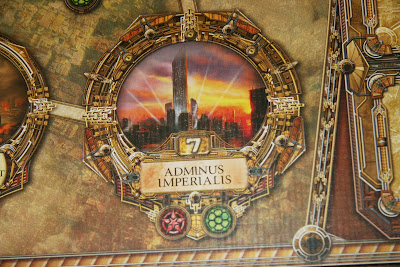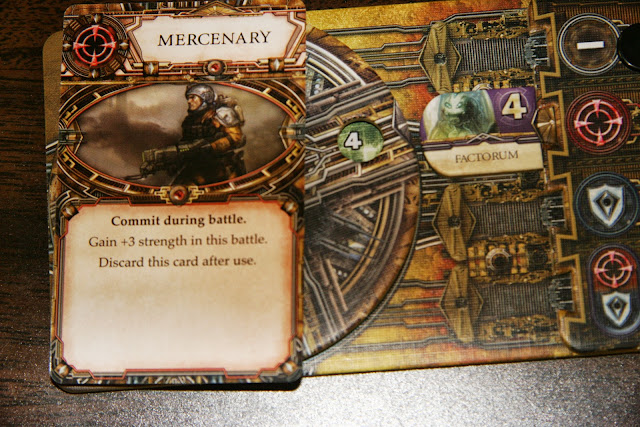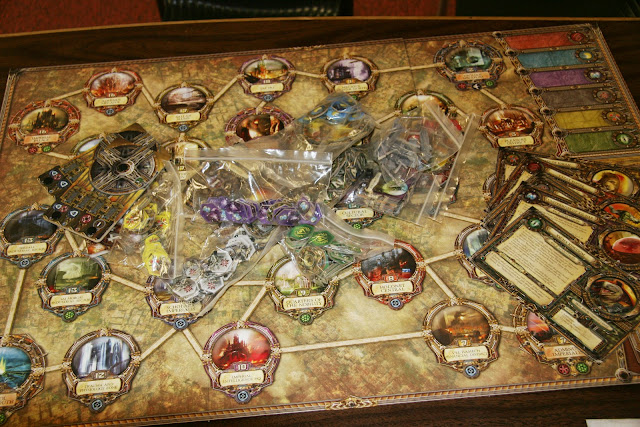Do you lust for power? Crave bloodshed and the chance to make your enemies squirm? Do you have a taste for trickery and double speak? If you answered yes to the above questions or if you just want to play a kick ass board game, I implore you to continue reading. Rex: Final Days of an Empire is an area control game with a lot going on, you will have to use battle tactics, politics, hand/resource management, bidding/bluffing and just the right amount of backstabbing to win.
In Rex, players choose one of 6 powerful races and fight for dominance of the continent sized city Mecatol Rex. Before we get into what my thoughts were, I am going to cover the setup process and briefly how to play.
Setup:
- Place the Game board.
- Populate the game board with the Influence tokens, Influence Cards, Strategy Cards, and the Dreadnought Fleet figure.
- Shuffle the Bombardment deck and deal each player a card, the player with the lowest numbered card goes first. Collect the cards, reshuffle the Bombardment deck and place it near the game board.
- Players select a race and take the corresponding race sheet, unit tokens, leaders, and ally advantage cards that pertain to their particular race.
- Deal 4 traitor cards to each player, they will select and keep one of these cards. Collect the remaining cards, reshuffle the deck and place it near the game board.
- The player to the left and the right of the first player each take a battle dial and secretly choose one number on the wheel, and then simultaneously reveal their number. Determine the difference of the chosen numbers. Then place the Dreadnought Fleet on that number, if the difference is greater than 18, or if both players chose the same number place the fleet in sector 1.
- Deal each player two strategy cards.
- Each follows the setup instructions on their race sheet. Collect influence, then places unit tokens on the corresponding game board spaces.
Objective:
The game ends when you or your alliance controls the required amount of 'Strongholds' 3 for an individual win, 4 for a pair and 5 strongholds for an alliance of 3 players.
Gameplay:
The game is broken up into 8 rounds, each round is broken into 7 phases, the game can end before the 8th round, but no matter what by the end of the 8th there will be a victor.
Influence Phase:
The first player draws the top card of the Influence deck and resolves it.
On the first turn all Sol Offensive cards are discarded and a new card is drawn, shuffle them back into the deck at the end of the phase.
The influence deck will make influence appear on the board, Sol Offensives cards will destroy Influence and units on specific locations and Temporary Ceasefires allow players to trade influence for 'favours' and create formal alliances where you exchange Ally Advantage Cards.
After a Sol Offensive card or Ceasefire card is drawn you draw until you `spawn`influence.
Bidding Phase:
The first player draws a number of strategy cards that is equal to the number of players that still have room to draw more cards, and places them face down in a row.
Then without being seen, the cards are then bid on by all the players that have room in their hands until all other players have passed. Once you pass you are out for that "card's" bidding, if everyone passes on a card, bidding for ALL cards is ended. The winner pays influence equal to his bid from his personal supply to the bank. Continues until all the cards have been purchased or until all players have passed on a single card.
Strategy cards can perform a wide range of abilities, they will help to enhance your battle value or defend against attacks, These cards add only one layer of the immensely deep and range strategies that one can use in Rex.
 |
| Cards are bid on blindly one at a time. 1 Card is placed out for each player that can physically bid on a card. (you cannot bid if you have max cards) |
Unfortunately for them. during the game some (hopefully not all) of your units will die. During this phase you can get some of your dead units back into the game. During the Recruitment phase you can get back up to 5 units and 1 leader from your dead units pile on the game board. Each dead unit costs two influence and dead leaders cost influence equal to their level to get back. Each race receives a certain number of dead units for free, as indicated on their race sheets these “free recruits” count toward the limit of 5 units. Note that you do not place these units on the board, simply back in your supply.
 |
| Units that `die`are placed into these spaces on the game board where you can gain them back into your supply during the recruitment phase. |
Maneuvering phase:
Starting with the first player, each player may move any number of his units on the board from any one space to one other space making sure to follow all movement rules.
Then that player may deploy any number of his units that are in their supply to any one space on the board at a cost of 1 influence per unit into a 'friendly' space and 2 influence per unit into a 'conflicted' space
'Friendly' spaces are either Empty spaces or spaces that only you occupy.
The movement speed of all races is 2 spaces unless they control the Spaceport and/or the Naval base then their movement speed is 4.
In order to achieve a victory via strongholds, the player or alliance must control the required number of strongholds at the END of the round.
Battle Phase:
Battles are where the majority of time is taken up in Rex and is also the part of the game with the most downtime. Battles occur when two or more players have units occupying same space they must fight until only one player remains in the space.
Situation Report
Each player tells the other how many units they have on the space, how many strategy cards they have in their hands, and the strength of his leaders in reserve.
Choose Strength
Each player takes a battle dial and secretly selects a number from 0 up to the number of that player's units on the space. Keeping in mind that even if you win, these units will be lost, so do not bet all of your troops if you are attacking a space!
Each player must choose a leader from those available and connect it to one of the slots on the battle dial. There are four slots and where you place your leader determines which strategy card(s) you will play. You must play a card if you selected that you were going to similarly, you cannot play a card if you chose not to.
The first slot indicates that you will not be playing any cards.
The second slot indicates that you will be playing only an attack card.
The third slot indicates that you will be playing only a defense card.
The fourth slot indicates that you will be playing both an attack card and a defense card.
Reveal Battle Dials
Both players simultaneously turn over their battle dials.
Commit Strategy Cards
Both players then simultaneously reveal their chosen strategy cards, if any.
Reveal Traitors
Each player was dealt a traitor card at the start of the game, if your opponent has a leader attached to their dial and you have the matching traitor card then you may choose to reveal the traitor card in which case you automatically win the battle and lose no units.
 |
| Examples of traitor cards and their matching Leaders. |
Resolve Committed Strategy cards
In order of play each player resolves their chosen strategy cards.
Determine Winner
Whoever has the highest total attack value is declared the winner.
If there is a tie than the win goes to the player with the earliest turn in order of play.
If you win the combat then you lose units equal to the number on your battle dial, and you may discard or keep any of the strategy cards you committed to the battle.
If you lost the combat then you lose all of you units and must discard all of your strategy cards.
Important Note: This is the only time you may discard a strategy card, keep your hand limit in mind at all times.
Collection Phase:
Each player collects 2 influence every turn. Then each player collects 2 influence per unit on each space where there are influence tokens.
 |
| After the battle there is only 1 unit remaining in the space to collect influence. |
The first player reveals the top card of the bombardment deck and moves the Dreadnought Fleet the number of sectors shown on the card. Sectors of the same number do not count as multiple spaces for the Fleet to move through. All units and influence along the way from start to the ending space are destroyed unless they are underneath a shield. The bombardment card is now shuffled back into the deck and a new round is ready to start beginning with a new first player.
One of the other enjoyable parts of Rex is the time requirement.
Components: For the most part, the components are awesome. Before buying Rex I had read a lot of complaints about the functionality of the board, the quality of the battle dials and a few other component complaints which I thought was odd for an FFG game. Thankfully the board turned out to be functional and visually attractive, you could hang it as a decoration. The battle dials were a pain in the ass to put together but once they clipped in I haven't had them 'fall apart' like some forum posts lead me to believe. The rulebook was a bit of a struggle though... I will cover some of what I thought were confusing parts of the rulebook below.
Betrayal Cards should not be optional, the game felt lacking something our first play (we did get a couple rules wrong but I dont think that was it) they add so much to the game play with them its only 1 more little rule.
Rules Complaints: So even they know their rulebook is terribly written I found this insert starring at me when I first opened the box.
By far the most confusing part is the influence spawn, there are some wrong player aids on bgg that definitely added to my confusion.
1. You can only get influence from spaces on the map where there physically are influence tokens
2. Influence tokens only appear based on the card revealed every turn.
3. If a ceasefire / sol offensive card is revealed, resolve them and then turn over cards until you reveal one that spawns Influence.
These were very important and combined lead to our first two games being played slightly wrong.
Battles: You have to commit a leader, I mentioned this above but I missed it and a friend caught this one before we played our first game. Also tricky to find in the book is that your leader only dies if a strategy card or traitor card is played.
Also mentioned above, but one cannot simply discard strategy cards at their leisure.
There were a few other small confusions but they were cleared up by this fantastic player aid, it helped me a lot, this is the one I would recommend using out of ones that exist on bgg
Who would enjoy Rex?
Gamer Gamers - With a play time of at least 2 hours, Rex doesn't leave much room for casual or family play, here are some reasons you should add Rex to your collection if you are a "serious" gamer.
- Very political with tons of player interaction
- Endless number of strategies
- Minimal Luck and no dice combat system
- Many 'different levels of conflict' direct combat, blocking, negotiation, economic, betrayal, secret victory conditions
- Infinite replay
Usually when games approach the 3 hour mark they have no chance of seeing my gaming table, however despite Rex not being my group's "type of game" everyone has been dying to play again and we met up twice extra last week to play.
After finishing my review I decided that really the rules are simple enough that a casual gamer could play and I believe would thoroughly enjoy the mechanics since Rex is an awesome experience that differs from most games. I would recommend having mostly experienced players if you are going to teach a casual friend though.



















I agree 100% with your review. I think the game really needs someone to really manage the game's flow, but in general there isn't a lot to really hang things up outside of some AP issues with some of the race abilities.
ReplyDeleteI think as long as you get through the bidding phase relatively quickly it shouldn't drag on, but yeah definitely need someone to keep things rolling through the phases.
DeleteThanks for sharing tthis
ReplyDelete